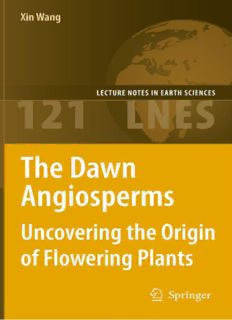
The Dawn Angiosperms: Uncovering the Origin of Flowering Plants PDF
Preview The Dawn Angiosperms: Uncovering the Origin of Flowering Plants
Lecture Notes in Earth Sciences 121 Editors: J.Reitner,Göttingen M.H.Trauth,Potsdam K.Stüwe,Graz D.Yuen,USA FoundingEditors: G.M.Friedman,BrooklynandTroy A.Seilacher,TübingenandYale Forfurthervolumes: http://www.springer.com/series/772 Xin Wang The Dawn Angiosperms Uncovering the Origin of Flowering Plants 123 Dr.XinWang NanjingInstituteofGeologyandPalaeontology ChineseAcademyofSciences 39BeijingDongRoad Nanjing210008 and FairylakeBotanicalGarden 160XianhuRoad Shenzhen518004 People’sRepublicofChina [email protected] ISSN0930-0317 ISBN978-3-642-01160-3 e-ISBN978-3-642-01161-0 DOI10.1007/978-3-642-01161-0 SpringerHeidelbergDordrechtLondonNewYork LibraryofCongressControlNumber:2010930229 ©Springer-VerlagBerlinHeidelberg2010 Thisworkissubjecttocopyright.Allrightsarereserved,whetherthewholeorpartofthematerialis concerned,specificallytherightsoftranslation,reprinting,reuseofillustrations,recitation,broadcasting, reproductiononmicrofilmorinanyotherway,andstorageindatabanks.Duplicationofthispublication orpartsthereofispermittedonlyundertheprovisionsoftheGermanCopyrightLawofSeptember9, 1965,initscurrentversion,andpermissionforusemustalwaysbeobtainedfromSpringer.Violations areliabletoprosecutionundertheGermanCopyrightLaw. Theuseofgeneraldescriptivenames,registerednames,trademarks,etc.inthispublicationdoesnot imply,evenintheabsenceofaspecificstatement,thatsuchnamesareexemptfromtherelevantprotective lawsandregulationsandthereforefreeforgeneraluse. Coverdesign:IntegraSoftwareServicesPvt.Ltd.,Pondicherry Printedonacid-freepaper SpringerispartofSpringerScience+BusinessMedia(www.springer.com) Tomyparent, whohavebeensupportive throughoutmylifeandcareer. Preface Angiospermsarethemostdiversifiedplantgroupintheworld,beingrepresentedby ca300,000speciesinabout400families.LikeallofLife,includingourselves,they havehadtheirownhistoryandgonethroughmanyevolutionarystagesbeforethey arrived at their current forms. The origin of Angiospermae (flowering plants) has been the subject of much dispute because this is a key event in the history of life, andhasafar-reachinginfluenceonourunderstandingofrelationshipsamongseed plantsasawholeaswellaswithintheangiosperms.Untilrecentlymostofpalaeob- otanistsrecognizedangiospermsonlyfromtheCretaceousandyoungerstrata.This contradictstheresultsofmolecularanalyses. IhavebeenworkingonMesozoicfossilplantsforthepasttwodecades,during which time I have studied a number of fossil plants. Some of these fossil plants have been published as Jurassicangiosperms, and, unsurprisingly, many questions anddoubtshavebeenraisedaboutthem.Thesequestionsneedtobeaddressedseri- ouslyandjournalpapersdonotprovidesufficientspacetocompareandrelatethese earlyangiosperms.Inthisbookthesepioneerangiospermsaredocumentedindetail, sometimes with new specimens not studied before. Also, I propose a definition of angiosperms that could be adopted in palaeobotany. My aim is to improve clarity andobjectivityofjudgmentaboutwhatconstitutesafossilangiosperm. In Chap. 1, a brief introductory overview of angiosperms is given. In Chap. 2, some of the already suggested ancestors of angiosperms are noted. Chapter 3 dis- cussesthevariousfeaturesscientistshaveusedtodefineangiosperms,andanindex character for fossil angiosperms is selected. Chapter 4 gives a brief summary of the geological and biological backgrounds of fossil plants to be elaborated upon in later chapters. Chapters 5–7 document in detail several angiosperms or possi- bleangiospermsfoundintheEarlyCretaceousandJurassicofnortheastChinaand southGermany,andthesechaptersformthecoreofthebook.Chapter8,basedon currentknowledge,raisesanewhypothesisonflowerformationanddiscussespossi- bleoriginandhistoryofevolutionarydevelopmentforcarpelsandflowers.Chapter 9 summarizes the results as a whole and provides suggestions for future study in relatedfields. There are 362 pictures and drawings in 101 figures. These pictures represent the fossil plants in a way more direct and objective than words, which more vii viii Preface likely reflects my personal inclination in interpretation as well as wording. Total 530 references are cited. The readers can refer to these references for further information. It is expected that this book, like many others, will have certain controversial aspects. The publishing of this book can only serve as a starting rather than a concluding point for works on these fossils as well as the origin of angiosperms. Everythinginthisbook,includingcriteria,definitions,interpretations,andconclu- sions, is open to discussion. Readers are always welcome to interpret the data in this book from their own perspectives. I hope the readers can feel free to send me theiropinions.Ibelievethefuturestudyofearlyangiospermswillbenefitfromsuch feedbackandinteraction. Nanjing XinWang January,2010 Acknowledgements Mystudiesoftheplantfossilsdescribedinthisbookcanbedatedbacktotheearly 1990s, and some of the fossil collecting was done even before that time. During thislongperiodIhavebenefittedfromtheconstantsupportfrommyadvisors,Drs. Shuying Duan, Ye Chen, David L. Dilcher, and Zhiyan Zhou. Many colleagues, including Drs. Shaolin Zheng, Jinzhong Cui, Shijun Wang, Baoyin Geng, Yong Yang,andmyadvisorsco-authoredseveralpaperswithme.Manyothercolleagues and friends have offered valuable support and constructive suggestions from var- ious aspects, including Drs. Wu Zhang, Zhaoliang Xu, Jingeng Sha, Yongdong Wang,ShuangxingGuo,QiangJi,JunWang,YiWang,YaosongXue,Chuanming Zhou,DongRen,YuanWang,ShunqinWu,FangZheng,ShurenZhang,Weiming Wang,JianguoLi,CuilingHe,ChunzhaoWang,ErjunZhuo,ZhiqinWang,Xiting Cheng,KaiheDu,YinhouXiao,MinFeng,JieWen,ZhiDu,XuejianYang,Zhaoyi Meng, Xin Xu, Song Ge, Liangqian Li, Hongzhi Kong, Qiang Zhang, Gang Li, Haichun Zhang, Qin Leng, Yibo Luo, Hongxia Liu, Yan Liang, Gongle Shi, Yan Fang,HongtaoCai,GangHan,ShikuanLiang,YanChen,PeterStevens,DennisW. Stevenson,MichaelFrohlich,WalterJudd,KevinNixon,JamesDoyle,PeterCrane, Michael Krings, Stefan Schmeiβner, Günter Dütsch, Martin Kirchner, Johanna H.A. van Konijnenburg-van Cittert, Steve McLoughlin, Thomas N. Taylor, Nora Dotzler, Larry Hufford, Meizhen Cao, Zhenyu Li, Jianan Zhu, Catarina Rydin, StevenManchester,FrédéricJacques,andMichaelHeads.Drs.DouglasMcKinnon, Williams Rose, and Margaret Joyner have helped with English in publications. Dr. Christopher Hill has gone through the whole book and given constructive and detailedsuggestions.Iwishtoextendmycordialthankstoallofthem. TheresearchissupportedbytheNationalNaturalScienceFoundationofChina Programs (Nos. 40772006, J0630967, and 40632010), Ministry of Science and Technology, PRC (2006FY120400), the State Key Laboratory of Systematic and Evolutionary Botany at the Institute of Botany, Chinese Academy of Sciences, theScientificResearchFoundationforReturnedOverseasChineseScholars,State Education Ministry, National Platform for Sharing Resources of Fossils and Minerals.ThisworkisacontributiontoUNESCO-IUGSInternationalGeoscience ProgrammeIGCP506. ix
Description: